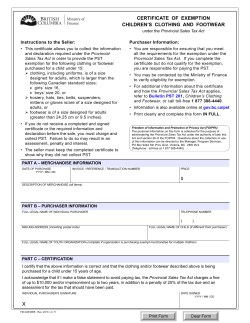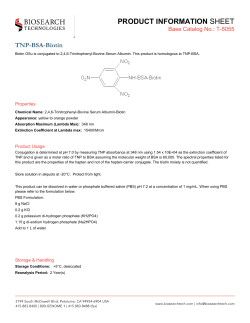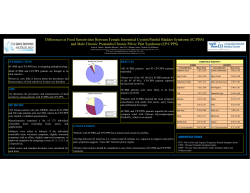
a PDF version
PUF QUESTIONNAIRE PELVIC PAIN and URGENCY/FREQUENCY PATIENT SYMPTOM SCALE To help your physician determine if you have interstitial cystitis (IC), also known as painful bladder syndrome (PBS), please answer the following questions by providing the number score associated with the best possible answer. PATIENT’S NAME: TODAY’S DATE: SCORE 0 1 2 3 4 1 How many times do you go to the bathroom during the day? 3-6 7-10 11-14 15-19 20+ 2A How many times do you go to the bathroom at night? 0 1 2 3 4 2B If you get up at night to go to the bathroom, does it bother you? NEVER OCCASIONALLY USUALLY ALWAYS 3A Do you now or have you ever had pain or symptoms during or after sexual intercourse? NEVER OCCASIONALLY USUALLY ALWAYS 3B Has pain or urgency ever made you avoid sexual intercourse? NEVER OCCASIONALLY USUALLY ALWAYS Do you have pain associated with your bladder or in your pelvis (vagina, labia, lower abdomen, urethra, perineum, testes, or scrotum)? NEVER OCCASIONALLY USUALLY ALWAYS MILD MODERATE SEVERE 4 5A If you have pain, is it usually 5B Does your pain bother you? NEVER OCCASIONALLY USUALLY ALWAYS 6 Do you still have urgency after going to the bathroom? NEVER OCCASIONALLY USUALLY ALWAYS 7A If you have urgency, is it usually MILD MODERATE SEVERE 7B 8 Does your urgency bother you? OCCASIONALLY USUALLY ALWAYS NEVER SYMPTOM SCORE BOTHER SCORE Are you sexually active? YES / NO *Developed by C. Lowell Parsons et al; PUF Questionnaire (Pelvic Pain, Urgency, and Frequency) © 2002. SEE RESULTS ON NEXT PAGE Visit www.defeatic.com for more information on symptoms and diagnosis for IC/PBS. SYMPTOM SCORE (1, 2A, 3A, 4, 5A, 6, 7A) BOTHER SCORE (2B, 3B, 5B, 7B) TOTAL SCORE (SYMPTOM SCORE + BOTHER SCORE) HOW TO READ YOUR RESULTS ©2015 Imprimis Pharmaceuticals, Inc. All Rights reserved. After adding your symptom score and your bother score, use that score to read your results summary on the next page. PUF QUESTIONNAIRE PELVIC PAIN and URGENCY/FREQUENCY PATIENT SYMPTOM SCALE Use your combined score from the previous page to read your results summary below. SCORE OF 0-4 You have a risk of less than 2% chance of having a positive potassium sensitivity test (PST). A positive PST is known to be associated with problems in the bladder epithelial that can be typically present in patients with interstitial cystitis (IC), also known as painful bladder syndrome (PBS). It has been shown that approximately 80% of patients with IC/PBS have tested positive when given the PST. It has been shown in a study that up to 1 in 4 may be at risk of having symptoms associated to IC. Visit www.DefeatIC.com for more information on symptoms and diagnosis for IC/PBS. SCORE OF 5-9 You have a risk of 55% chance of having a positive potassium sensitivity test (PST). A positive PST is known to be associated with problems in the bladder epithelial that can be typically present in patients with interstitial cystitis (IC), also known as painful bladder syndrome (PBS). It has been shown that approximately 80% of patients with IC/PBS have tested positive when given the PST. If you are having symptoms continuously, you should consult your doctor as you may be at risk for IC. Visit www.DefeatIC.com to find an IC specialist today. SCORE OF 10-14 You have a risk of 74% chance of having a positive potassium sensitivity test (PST). A positive PST is known to be associated with problems in the bladder epithelial that can be typically present in patients with interstitial cystitis (IC), also known as painful bladder syndrome (PBS). It has been shown that approximately 80% of patients with IC/PBS have tested positive when given the PST. You are at high risk and should consult your symptoms with your doctor. It is recommended you consult with an IC specialist, as they can provide a timely and proper diagnosis. Visit www.DefeatIC.com to find an IC specialist today. SCORE OF 15-19 You have a risk of 76% chance of having a positive potassium sensitivity test (PST). A positive PST is known to be associated with problems in the bladder epithelial that can be typically present in patients with interstitial cystitis (IC), also known as painful bladder syndrome (PBS). It has been shown that approximately 80% of patients with IC/PBS have tested positive when given the PST. You are at high risk and should consult your symptoms with your doctor. It is recommended you consult with an IC specialist, as they can provide a timely and proper diagnosis. Visit www.DefeatIC.com to find an IC specialist today. SCORE OF 20 OR HIGHER You have a risk of 91% chance of having a positive potassium sensitivity test (PST). A positive PST is known to be associated with problems in the bladder epithelial that can be typically present in patients with interstitial cystitis (IC), also known as painful bladder syndrome (PBS). It has been shown that approximately 80% of patients with IC/PBS have tested positive when given the PST. You are at high risk and should consult your symptoms with your doctor. It is recommended you consult with an IC specialist, as they can provide a timely and proper diagnosis. Visit www.DefeatIC.com to find an IC specialist today. *Developed by C. Lowell Parsons et al; PUF Questionnaire (Pelvic Pain, Urgency, and Frequency) © 2002. Reference: Parsons CL, Dell J, Stanford EJ, et al. Increased prevalence of interstitial cystitis: previously unrecognized urologic and gynecologic cases identified using a new symptom questionnaire and intravesical potassium sensitivity. Urology 60(4): 573-578, 2002. Defeat ICTM is a trade mark of Imprimis Pharmaceuticals, Inc. ©2015 Imprimis Pharmaceuticals, Inc. All Rights reserved.
© Copyright 2025











